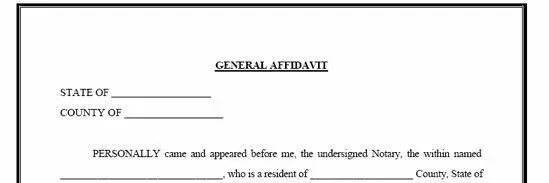What is an Affidavit?
An affidavit is a formal sworn statement of fact signed by the original author. The original author is technically called the “affiant” or “deponent.” The document is to be officially witnessed as to the authenticity of the affiant’s signature by a notary public.
The name affidavit originates from Medieval Latin, where it stood for he has declared upon oath. An affidavit is a type of verified statement or showing, or in other words, an affidavit contains a verification, meaning it is under oath or penalty of perjury and is required for court proceedings.
Use of Affidavits
Following are examples of how affidavits can be used:
- An affidavit can be used to gather evidence from witnesses or participants who may not be available to testify in person before the court. Also, those who may otherwise fear their safety if their true identities are revealed in court. In this situation, the person writes down their testimony, and a notary public authorizes and confirms the authenticity of the affidavit.
- An affidavit can be used to obtain a declaration on a legal document, such as an application for voter registration, that the information provided by the applicant is truthful to the best of the applicant’s knowledge. If, after signing, the information is found to be deliberately untrue with the intent to deceive, the applicant may face perjury charges.
How is it written?
Affidavits may be written in the first or third person, depending on who drafted the document. If in the first person, the document’s parts are:
- A commencement that identifies the affiant
- The individual averments, almost always numbered as mandated by law, each one making a separate claim
- A statement of truth generally stating that everything is true, under penalty of perjury, fine, or imprisonment
- An attestation clause, usually a jurat, in the end, certifies the affiant made an oath and the date.
- An affidavit notarized or authenticated includes a caption with a venue and title about judicial proceedings. In some cases, an introductory clause called a preamble, is added, attesting that the affiant personally appeared before the authenticating authority.
What do Private Investigators Need to Know?
Private investigators may encounter affidavits during their work, and understanding the basics is crucial. An affidavit is a written statement confirmed by oath or affirmation, often used as evidence in court. Here are some key points that private investigators should know about affidavits:
Purpose and Contents of an Affidavit
- Affidavits are used to present facts or evidence in a legal setting.
They are often submitted to support or oppose motions, provide information in legal proceedings, or as part of an investigation. - Affidavits typically include the affiant’s (person making the statement) personal information, such as name, address, and occupation.
The statement should be clear, concise, and factual, detailing the specific information relevant to the case or investigation.
Legal Aspects
- Affiants must swear or affirm that the information provided is true and accurate to the best of their knowledge and belief.
- A notary public or another authorized official often administers the oath and verifies the affiant’s identity.
- Making false statements in an affidavit can result in legal consequences, including perjury charges.
- Private investigators should ensure that the information in the affidavit is accurate and based on reliable sources.
- Affidavits are generally admissible as evidence in court, but the rules regarding their use may vary by jurisdiction.
- Private investigators should know the legal requirements for affidavits in their operating regions.
Use in Investigations
- Private investigators may need to prepare affidavits based on their findings during an investigation.
Affidavits can be used to obtain search warrants, support legal actions, or document witness statements. - Private investigators should be mindful of the privacy and confidentiality issues related to the information included in an affidavit.
Redaction of sensitive information may be necessary to protect individuals involved in the investigation. - Private investigators should consult legal professionals to ensure that affidavits adhere to legal requirements and standards.
Documenting the Affidavit Process
- Private investigators should maintain thorough documentation of the process involved in creating and submitting an affidavit. This includes any supporting documentation or evidence.
- Understanding the proper procedures for creating and handling affidavits is essential for private investigators to effectively contribute to legal proceedings and investigations. Consulting with legal experts ensures that the affidavits meet the necessary legal standards.
Learn More
See our Glossary of Investigation Terms if you’d like to learn about other terms and definitions.


